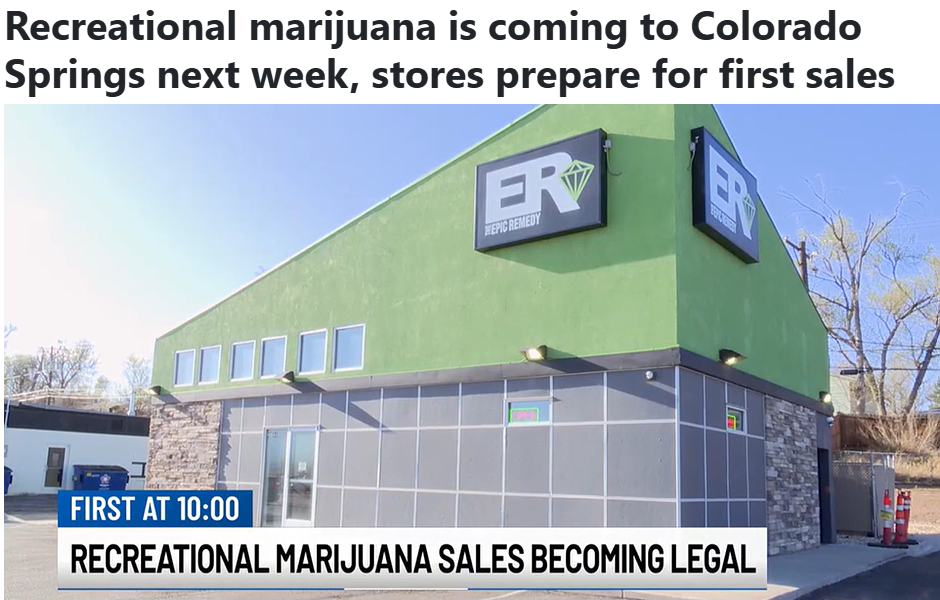The Road to Legalization: How Recreational Cannabis Became Legal in Colorado Springs
In April 2025, Colorado Springs officially joined the ranks of cities in Colorado permitting the sale of recreational cannabis. This milestone marked a significant shift in the city’s stance on marijuana, transitioning from a long-standing prohibition to embracing a regulated market. Central to this transformation was The Epic Remedy, a local dispensary that played a pivotal role in the legalization process.
A Decade of Prohibition
Despite Colorado legalizing recreational marijuana statewide in 2012, Colorado Springs maintained a ban on recreational sales for over a decade. The city, known for its conservative values and military presence, allowed only medical marijuana dispensaries to operate, citing concerns over public safety and community values.
The Push for Change: Ballot Question 300
In November 2024, the tides began to turn. Voters were presented with Ballot Question 300, proposing that existing medical marijuana dispensaries be allowed to sell recreational cannabis. The measure passed with 54.7% approval, signaling a shift in public opinion. Simultaneously, a competing measure, Ballot Question 2D, aimed to permanently ban recreational sales but narrowly failed.
Legal Challenges and Advocacy
Following the vote, the Colorado Springs City Council attempted to introduce a new ballot measure to overturn the decision, citing voter confusion. This move faced immediate backlash. The co-owner of The Epic Remedy, alongside veteran advocates filed a lawsuit against the city, arguing that the council’s actions were unconstitutional. In February 2025, a district judge ruled in their favor, stating that the council’s attempt violated the Colorado Constitution.
Licensing and Implementation
With legal hurdles cleared, the city began accepting applications for recreational licenses. By mid-April, 27 dispensaries, including three locations of The Epic Remedy, received approval to commence recreational sales. These locations included East Fountain Boulevard, West Colorado Avenue, and East Platte Avenue. The Epic Remedy Academy off Austin Bluffs and Academy will remain a medical dispensary.
Economic Implications
The introduction of recreational sales brought significant economic prospects. City officials projected up to $2 million in new tax revenue in the first year, earmarked for public safety and mental health services. Additionally, the move aimed to retain cannabis-related revenue within the city, which previously flowed to neighboring municipalities like Manitou Springs.
The Epic Remedy’s Role
The Epic Remedy emerged as a frontrunner in the transition to recreational sales. Operations Manager DT emphasized the dispensary’s commitment to compliance and community engagement. “We expect to see a higher volume of people coming in. There’s less steps to be able to come in now—you just have to be 21 or over with a valid ID,” he noted.
The dispensary’s proactive approach, including staff training and inventory adjustments, ensured a smooth transition. Their efforts not only facilitated legal sales but also set a standard for other dispensaries in the region.
Community Response and Future Outlook
The community’s response to the legalization has been largely positive, with many residents appreciating the convenience and economic benefits.
The successful implementation of recreational cannabis sales in Colorado Springs marks a significant chapter in the city’s history. The collaborative efforts of dispensaries like The Epic Remedy, community advocates, and informed voters have reshaped the local landscape, aligning it more closely with statewide policies and public sentiment. The Epic Remedy is proud to have supported and now supply the community that fought for recreational cannabis legalization for years!
Axios Story: Weed is on teh Colorado Springs Ballot Again
https://www.cpr.org/2025/02/03/lawsuit-colorado-springs-marijuana-sales-revote/
For more information on The Epic Remedy and their services, visit their official website: The Epic Remedy.






